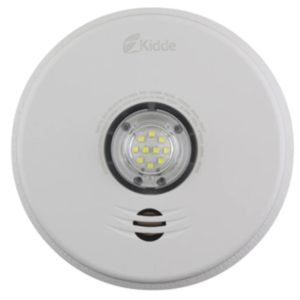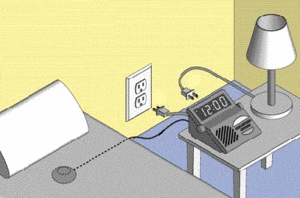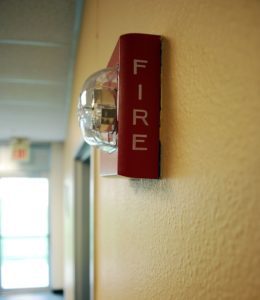April was Fair Housing month. Unfortunately, the Covid-19 pandemic led to cancellation of Fair Housing events throughout Massachusetts. Fair Housing laws prohibit landlords and sellers from not renting or selling housing to people based on prejudice against certain kinds of people (who have historically faced housing discrimination).
Sometimes deaf people are discriminated against based on their deafness. Some landlords are concerned that the tenant’s deafness will be a hazard to the property and the people in it. Some are concerned that modifying the apartment to allow for useful fire alarms will be expensive. Neither of these things is true. And the tenant pays for the modifications, not the landlord!
Alarms for the deaf and hard of hearing
 Massachusetts State Law requires that any residential property that is sold has proof that their fire and carbon monoxide alarms are working. The new owners sign a paper at closing that they will keep the alarms in working order.
Massachusetts State Law requires that any residential property that is sold has proof that their fire and carbon monoxide alarms are working. The new owners sign a paper at closing that they will keep the alarms in working order.
If there’s a fire or carbon monoxide leak in a house or condo, the fire alarms go off. They are loud enough to wake most people. But not all people.
Here is a one-page summary about what deaf and hard of hearing people do to keep themselves safe. It is fairly simple to install a flashing alarms, or a multi-frequency alarms to a hardwired alarm system. This would protect someone who cannot hear alarms, even when awake.
 There are specific strobe/vibrating alarms designed for the bedroom. This one-step solution is for someone who can hear an alarm, but does not feel safe relying on it to wake them up from sleep.
There are specific strobe/vibrating alarms designed for the bedroom. This one-step solution is for someone who can hear an alarm, but does not feel safe relying on it to wake them up from sleep.
If you travel, you can use this portable one. If you want to use your smart phone as your alarm, you can add an extra loud alarm, a strobe, and a bed shaker.
 People who need a light for warning, even when they are awake, can add strobe lights to their fire and carbon monoxide alarms. An electrician can add a strobe fixture to a hardwired alarm system. You can also add plug in alarms that have lights.
People who need a light for warning, even when they are awake, can add strobe lights to their fire and carbon monoxide alarms. An electrician can add a strobe fixture to a hardwired alarm system. You can also add plug in alarms that have lights.
Tenants in buildings with less than ten units can modify their apartments, on their own dime. If the modifications make the apartment less attractive to the next renter, you need to remove the strobes before you go. (That should be fine, since you’ll need them in your next place anyway).
If you rent in Public Housing or a building with more than ten units, your landlord may be asked to make these changes for you. Here’s the law, see paragraph 7a.
Deaf and hard of hearing people, 101.
Quick terms:
Frequency is the pitch of a sound. It is measured in Hertz. Adult male voices fall between 85 to 180 Hz, and adult female and children’s voices are from 165 to 255 Hz.
Decibels (dB) measure the loudness.
- 10 dB: Normal breathing
- 20 dB: Whispering from five feet away
- 30 dB: Whispering nearby
- 40 dB: Quiet library sounds
- 50 dB: Refrigerator
- 60 dB: Electric toothbrush
- 70 dB: Washing machine
- 80 dB: Alarm clock
- 90 dB: Subway train
- 100 dB: Factory machinery
- 110 dB: Car horn
- 120 dB: Ambulance siren source
Few people are totally deaf and hear nothing. Most deaf people are aware of some noises, in some frequencies, if they are loud. Hearing aids increase the volume of some frequencies to increase environmental sound awareness. Deaf people generally can’t rely on sound to keep them safe. When they are sleeping, they have no hearing aids on, so they hear even less than during the day.
Hard of Hearing people hear sound. However, they have difficulty with sounds that are in the speech range. They need to amplify sounds because they cannot hear low dB sound or can’t hear any sound in certain frequencies.
Deafness is generally defined as not being able to hear speech frequencies at normal speech volume. Social Security Disability defines deafness this way:
- An average hearing threshold of 60 to 90 decibels or greater in the better ear, dependent upon the testing method
OR
- A word recognition score of 40 percent or lower in the better ear
- Hearing Loss with a Cochlear Implant (2.11)– which automatically qualifies medically for disability benefits for at least one year after surgery. Source
Deaf Inc is a good place to learn more about hearing impairment and deafness in Massachusetts.

Leave A Comment